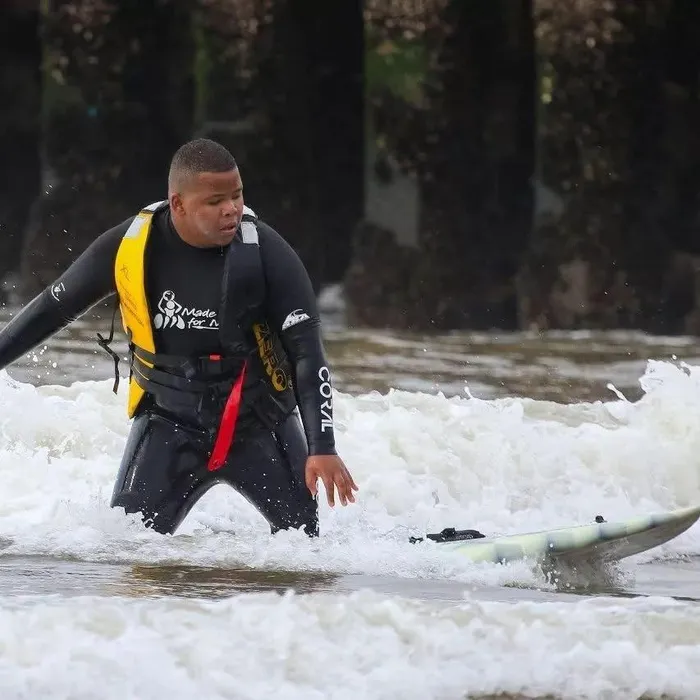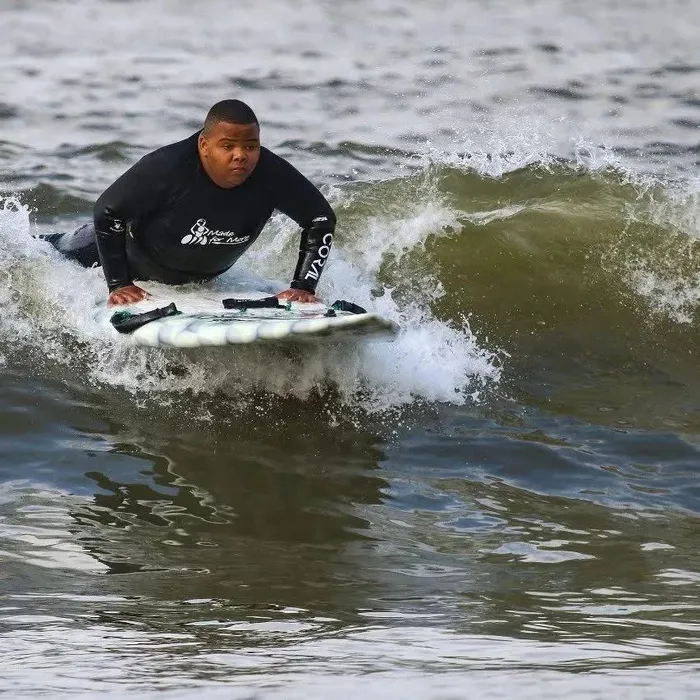UWC launches innovative Para Sports Initiative to empower students with disabilities

First-year UWC student, Thando Ngcikwe, who discovered para-surfing
Image: Supplied
For years, the university experience for students with disabilities has been overshadowed by limited opportunities in sports, a stark contrast to their active lives in school. Recognising this gap, the University of the Western Cape (UWC) has announced the launch of the Para Sports Initiative, an innovative programme aimed at reintegrating these students into the vibrant world of athletics. This initiative, resulting from a collaborative effort between the Office for Students with Disabilities (OSwD) and UWC Sport, stands as a testament to the university's commitment to inclusivity.
The framework of the initiative is founded on the idea that "para" means parallel rather than paraplegic, signifying an effort to create sports that run alongside mainstream activities. “Students with disabilities shouldn’t feel excluded from university life,” said Craig Loubser, the OSwD Administrative Assistant focused on student wellness and support. With five years of meticulous planning culminating in this launch, the initiative promises to foster not only physical fitness but also mental health, social connections, and a strong sense of belonging.
The programme will kick off with a Para Sports Activation on 10 September, outside the Jakes Gerwel Hall at the UWC Main Campus in Bellville. This event will be a precursor to the official launch on 19 September 2025 at the UWC Sports Stadium, where activities will showcase wheelchair table tennis, boccia, seated volleyball, and the world’s fastest-growing sport, pickleball. UWC is proud to announce that it is the first South African university to incorporate pickleball, allowing students with and without disabilities to compete together.
What truly sets this initiative apart is its guiding principle of “nothing about us without us.” Students with disabilities will not only participate but will also take on leadership and administrative roles within the programme. The palpable excitement surrounding this initiative was evident as Loubser stated, “Our goal is to create a space where students with disabilities can stay active, feel connected, and know they belong on and off the court.”

First-year UWC student, Thando Ngcikwe, doing his thing as a para-surfing athlete
Image: Supplied
Among those championing this new direction is Allanzo Donn-Lea Mapoe, a visually impaired athlete and Boland Provincial Blind Cricket player. At the age of 21, Mapoe reflects on his journey with pride, stating, “I started playing blind cricket at eight, and my proudest moment has been making the Boland team.” He acknowledged that for many individuals with visual impairments, reaching such milestones often required immense determination and support. “Don’t let the voices that say ‘you can’t’ distract you,” he advised. “Believe in yourself, keep pushing forward, and you’ll be amazed at what you can achieve.”
First-year UWC student, Thando Ngcikwe, an advocate for differently-abled athletes, shared a similar sentiment. Ngcikwe discovered para-surfing through the Roxy Davis Foundation in 2021 and has since represented UWC at multiple competitions. “It’s about camaraderie, solidarity, and celebrating together through sport,” he said passionately. As deputy chairperson of the Western Cape Representative Council of Learners, Ngcikwe also works to amplify the voices of students with disabilities on broader platforms.
Established in 1996, the Office for Students with Disabilities has continually advocated for inclusive education, providing comprehensive support to enhance academic success and facilitate a smoother transition for students into university life. The establishment of a universal design office in 2019 marked a significant development in ensuring all students have equitable access to higher education.
The UWC Para Sports Initiative signifies a monumental shift in how students with disabilities engage with university life, fostering a culture of inclusion and empowerment. As the university prepares for the activation event, the anticipation among students and faculty alike exemplifies a shared commitment to an inclusive future.
Related Topics: